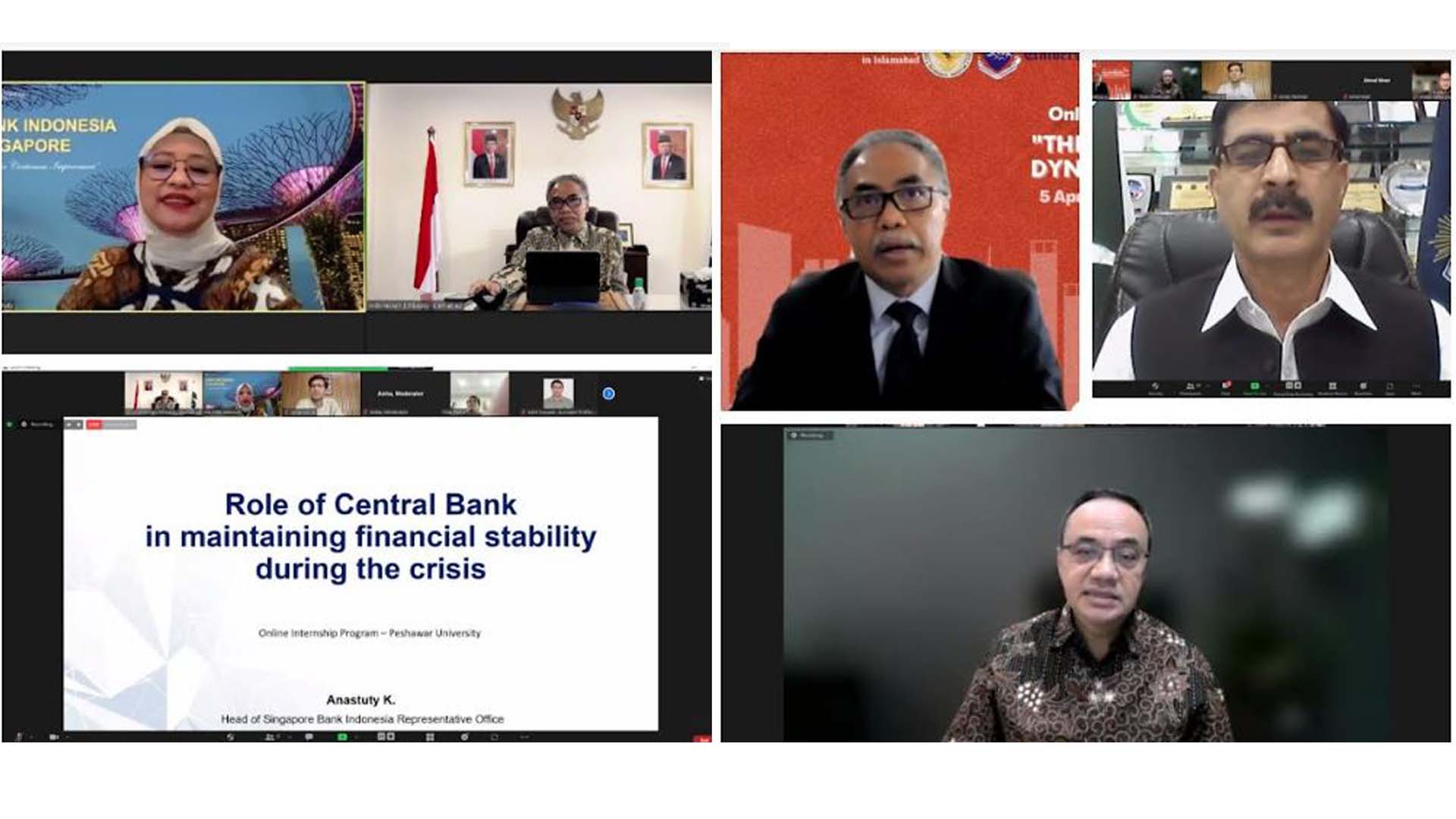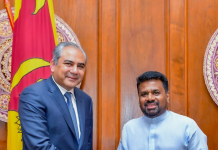Special Correspondent
ISLAMABAD: The Online Internship Program “Contemporary Dynamics of Indonesia” held its second part on the “Role of Central Bank in maintaining financial stability during the crisis”. Ms. AnastutyKusumowardhani, Chief Representative Bank of Indonesia, Singapore, and Dr. Amir Hussain, University of Peshawar were the speakers on the occasion.
The Online Internship Program is being organized as a collaboration between the Indonesian Embassy and the University of Peshawar.T he University of Peshawar is one of the Universities where the Indonesian Embassy intends to establish “Indonesian Corner” since it is the one of the oldest and prestigious university in Pakistan and also considered to be the mother university in the KPK province.
Indonesian Ambassador Adam Tugio has described the OIP as prelude to the “Indonesian Corners” that the Embassy looks forward to establish at the leading Universities in Pakistan. According to Ambassador Adam Tugio the “Indonesian Corners” were intended to serve as the hub of academic and cultural activities to enhance linkages between the academia, artists and professionals of the two countries by way of organizing various programs such as language courses, online internship programs, seminars, festivals, sports events and other activities of common interest.
At the session, the Guest Speaker from the Bank of Indonesia began her presentation with the history of the Bank of Indonesia which is the Central Bank of Indonesia. She outlined the tasks, role, duties and functions of the bank and shared its vision and mission with the audience.
Ms. Anastuty Kusumowardhani said that Covid-19 placed the Indonesian economy under enormous pressure in 2020, with sources of turbulence unlike anything before. The immediate Government response to curb the spread of Covid-19 through imposition of large-scale social restrictions, inevitably weighed on economic performance. Policies aimed at containing the spread of Covid-19, led to reduced personal mobility and a drop in spending on goods and services. She said that the consumption, investment, transportation, tourism, production and the confidence of economic agents fell significantly, resulting in a sharp drop in economic growth.
Policy synergies pursued by the Government, Bank Indonesia and relevant authorities sought to mitigate the extraordinary impact of Covid-19 and worked continually to build optimism for economic recovery. The BI representative shared the salient features of the National Economic Recovery Program which provided coordination and synergy among the Government, Bank Indonesia and other relevant Institutions and banks. She said that the national economic recovery program protected the consumption and purchasing power of the poor and vulnerable, funding for small and medium enterprises, tax incentives for businesses, the establishment of projects to absorb labor, and credit restructuring.
The Indonesian Speaker said that against a background of low inflation, Bank Indonesia pursued an accommodative policy mix by providing a monetary stimulus through repeated interest rate cuts and large-scale quantitative easing. This policy was supported by measures to stabilize the rupiah, relaxation of macro prudential policies and digitalization of the payment system.
She said that the Indonesia’s national economy in the second quarter of 2021 moved into positive territory for the first time since the Covid-19 outbreak at the beginning of 2020, achieving 7.07% (yoy) growth. Moving forward, she said that the Bank Indonesia projects national economic growth in Indonesia in 2022 in the 4.7-5.5% range, up from 3.2-4.0% in 2021, driven by ongoing economic improvements that are driving solid export performance, coupled with growing domestic demand in terms of consumption and investment. This is supported by a faster vaccination rollout, reopening of economic sectors and policy stimuli.
The Speaker stated that the Bank of Indonesia policy mix in 2022 will remain synergized as part of the national economic policy direction to accelerate recovery while maintaining economic stability. She said that the inflation will remain under control within the 3.0%±1% target corridor in 2022 and the current account deficit will remain low and manageable in the 1.1-1.9% range in 2022 and added that the digital economy and finance will also expand quickly and significantly.
She informed that the policy mix comprised five salient policy instruments that included Monetary Policy, Macroprudential Policy, Payment System Policy, Financial Market Deepening Policy, MSME Policy and the Sharia Economy and Finance.
She concluded that Indonesia had strong financial foundations but the Government continue to address several risks including commodity price volatility, inflation, disruption of supply chain, and the emerging geopolitical dynamics such as Russia-Ukraine Conflict and the rising oil prices that were hampering global economic recovery.
Dr. Amir Hussain, Assistant Professor, Institute of Management Sciences, University of Peshawar while speaking on the occasion said that Pakistan central bank faced the similar challenges like Indonesia and divided Pakistan’s financial crisis in the Pre COVID-19, During the COVID-19 and Post COVID-19 categories and provided details about how the Government and the central bank played its role in managing the crisis.He cited new government coming to power following the 2018 elections and issues pertaining to the IMF program among the major reasons for the Pre COVID-19 Crisis when the Government had to really work hard to reduce the fiscal and current account deficit. He also discussed how the government focused on the construction industry and managed to improve the economic indicators.
He also touched upon the government policy shift to stop artificially control foreign currency exchange rate and the impact of the switching to the market-based flexible exchange rate system which resulted in the major depreciation of the local currency rate and impacted on fiscal policy rate and triggered inflationary pressures. He also highlighted government social safety and poverty alleviation programs and the loan and tax incentives to the industrial sectors and businesses to protect the vulnerable segments of the society. He outlined Pakistan central bank key measures and incentives to absorb the negative impacts of the COVID-19 during the pandemic which included housing schemes for the general public on low mark up and the Roshan Pakistan Digital Account for the Pakistan overseas as innovative and bold steps of the government that it worked out together with the central bank of Pakistan.
The next session of the OIP on Indonesia’s Potential in Sharia Economy & Halal Market is scheduled on 21st April 2022.

















